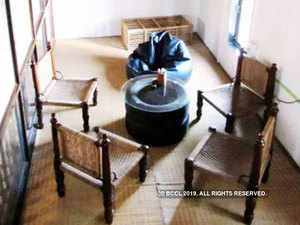 Agencies
AgenciesNew Delhi, Feb 10 () After decent growth of co-working segment in last few years, it's now co-living space which is creating buzz in India and has potential to become USD 93 billion market annually on rising demand from students and professionals, according to a study. News Corp and Softbank-backed realty portal PropTiger has termed the co-living space as "real estate goldmine" that remains largely untapped.
"This is evident from the fact that the supply by organised players in co-living is currently limited to over one lakh beds. Assuming they earn Rs 1.44 lakh per annum per bed, organised players in this segment are currently USD 206 million).
"If the existing demand-supply mismatch is fixed, this segment has the potentially to grow into a USD 93-billion market," PropTiger said in a report.
The report further found out that the co-living sector has total untapped demand of about 46.3 million beds, out of which 8.9 million is from student housing.
As per its survey, total occupancy recorded in hostels within college campuses across India was only 3.4 million students, leading to a demand-supply mismatch of 8.9 million students. This deficit for co-living spaces is currently being met by the unorganised sector, which includes PG accommodation and rental houses, etc.
On the current status, PropTiger said that entrepreneurs are launching co-living portals and tying-up with real estate developers to build project specifically meant for the co-living segment, especially for students and working professional.
Packed with modern amenities, these spaces are designed keeping in mind the needs of the targeted segment.
Co-living space meant for students are generally equipped with basic facilities such as housekeeping, laundry services, security and meals, apart from additional facilities such as gaming consoles, libraries, gyms, pools and high-speed Wi-Fi.
Among the existing players in the segment are RentMyStay, Rentroomi, SimplyGuest and Flathood. Other players such as NestAway, Stanza Living, Zolo, Placio and CoLive have recently entered this sector and raised funds to spread the business.
Lately, OYO Living has also entered the segment, with more than 2,000 beds in Noida, Gurugram, Bengaluru and Pune, the report said.
Proptiger suggested real estate developers, who are focusing only on commercial office spaces to expand their rent-generating portfolio, to seriously think about building spaces for co-living.
"Rental yield in this segment is higher as compared to traditional ways of renting a property," the study said.
Citing an example, it said that a property for students in Sector 125, Noida, is expected to give about 8-9 per cent rental yield whereas housing for professionals is expected to provide 5-7 per cent rental yield.
Investors also get tax rebate on housing loan if they take a loan for buying a residential property. The investor can enjoy the benefit of tax rebate, along with rental income, something not possible in case of commercial property.
PropTiger is part of Elara Technologies, Singapore-based technology services company that also owns two other portals - Housing.com and Makaan.com. The group provides digital real estate marketing and transactions services.
"This is evident from the fact that the supply by organised players in co-living is currently limited to over one lakh beds. Assuming they earn Rs 1.44 lakh per annum per bed, organised players in this segment are currently USD 206 million).
"If the existing demand-supply mismatch is fixed, this segment has the potentially to grow into a USD 93-billion market," PropTiger said in a report.
The report further found out that the co-living sector has total untapped demand of about 46.3 million beds, out of which 8.9 million is from student housing.
As per its survey, total occupancy recorded in hostels within college campuses across India was only 3.4 million students, leading to a demand-supply mismatch of 8.9 million students. This deficit for co-living spaces is currently being met by the unorganised sector, which includes PG accommodation and rental houses, etc.
On the current status, PropTiger said that entrepreneurs are launching co-living portals and tying-up with real estate developers to build project specifically meant for the co-living segment, especially for students and working professional.
Packed with modern amenities, these spaces are designed keeping in mind the needs of the targeted segment.
Co-living space meant for students are generally equipped with basic facilities such as housekeeping, laundry services, security and meals, apart from additional facilities such as gaming consoles, libraries, gyms, pools and high-speed Wi-Fi.
Among the existing players in the segment are RentMyStay, Rentroomi, SimplyGuest and Flathood. Other players such as NestAway, Stanza Living, Zolo, Placio and CoLive have recently entered this sector and raised funds to spread the business.
Lately, OYO Living has also entered the segment, with more than 2,000 beds in Noida, Gurugram, Bengaluru and Pune, the report said.
Proptiger suggested real estate developers, who are focusing only on commercial office spaces to expand their rent-generating portfolio, to seriously think about building spaces for co-living.
"Rental yield in this segment is higher as compared to traditional ways of renting a property," the study said.
Citing an example, it said that a property for students in Sector 125, Noida, is expected to give about 8-9 per cent rental yield whereas housing for professionals is expected to provide 5-7 per cent rental yield.
Investors also get tax rebate on housing loan if they take a loan for buying a residential property. The investor can enjoy the benefit of tax rebate, along with rental income, something not possible in case of commercial property.
PropTiger is part of Elara Technologies, Singapore-based technology services company that also owns two other portals - Housing.com and Makaan.com. The group provides digital real estate marketing and transactions services.







